LISTEN (22 minutes)
Before many hibernating animals began their long winter’s nap, they fattened up, so they can make it through the winter. According to CU Health Sciences researcher, Richard Johnson, we humans also evolved to put on weight. But for us, it’s not a change of seasons that gets the weight gain started. It’s a specific trigger, called, “Sugar.” Specifically a kind of sugar called fructose. In his new book, The Fat Switch, (Kindle Edition) Johnson traces the increasing availability of sugar among humans and how it has now made people fat, and sick for thousands of years. For instance, not all pharaohs were buff and thin. Close analysis has shown that many mummies have lots of skin folds, which means that before they dried out into mummies, many were fat. And the fattest ones generally had lots of access to sugars such as honey. In The Fat Switch, Johnson also talks about kings who loved rare and expensive sugar so much, some made sugar statues . . . and ate them . . . leading many to be so fat and prone to modern diseases such as diabetes and heart attack and stroke, Johnson dubs them victims of “Adipose Rex.” Johnsons’ book chronicles how, ever since sugar became cheap and widely available, more people have grown fat and sick. In THIS interview, Dr. Richard Johnson, focuses on how sugar affects children and increases the risk of everything from diabetes and obesity to ADHD. We begin how too much sugar can make any person’s body get stuck, storing the sugar as fat.
TRANSCRIPT FOLLOWS:
SHELLEY: Rick Johnson, a great deal of health policy and science is based on the idea that we are the number of calories we eat minus the amount of exercise that we do. and the reason people get fat in the United States is because we eat too much, and they don’t exercise enough. What do YOU think?
RICHARD JOHNSON: Tthat is the Law of thermodynamics. And basically a person will eat a certain number of calories. So, they take in a certain amount and they burn a certain amount, and what’s left over is stored as fat. And this equation is still true. It’s largely thought that the reason people are eating too much is because they’re getting big plates of food or drinking larger and larger volumes of fluid, of soft drinks and as a result we’re taking in more calories because our culture is feeding us more. It’s our Western diet — we’re asking for fast foods and soft drinks and the reason we’re exercising too little, most people think, is because we’ve got Internet, we got TV, we’ve got remote control. We have escalators and elevators and we have so many things to do without having to leave our chairs that we can just sit around and enjoy and do things without having to exercise. If you view it this way our culture is to blame for obesity today. But that isn’t actually the way it works. Research has showed that the reason people are eating more isn’t because they’re getting bigger plates of food but rather because they are becoming leptin resistant. There’s this hormone called leptin which controls our appetite and normally it will tell us when to quit eating but those people who are becoming obese have developed leptin resistance
SHELLEY: Their cells aren’t able to take in energy as efficiently. They get tired.
RICHARD JOHNSON: That’s right. So they become leptin resistant, so they can’t control their appetite and so the culture responds by giving bigger plates of food and by giving larger amounts of drinks because we’re asking for it because our bodies want it. And the reason we are exercising less is because we are producing less energy and so we are tired, and we’re sitting in the chair, and they’re making the TV more attractive to us because we’re going to be sitting there matter what
SHELLEY: Now, there’s lot of health policy built on the idea that the way to reverse this problem is to tell people, eat fewer calories. Exercise more. For many people, that does seem to work. But if somebody is already leptin resistant, if they’re already overweight and they’re feeling tired, will this work for them?
RICHARD JOHNSON: Well, first off, it’s going to be a struggle. If you’re leptin resistant, your hungry and so, if you’re trying to restrict your calories, it’s your willpower against your body power. If you’re strong and you really want to lose weight you can take on that diet, and you can lose that weight. The trouble is that at some point your desire to go back to eating more and exercising less is going to come back. It’s not hard to lose weight. The problem is trying to keep the weight off.
SHELLEY: The kinds of foods that people are told to eat, in order to lose weight, are the ones low in calories. Whole milk, that has fat in it–it’s recommended to avoid. In contrast, chocolate milk that’s 1% fat, or skim milk, those sweet beverages are recommended for drink to children. Does that make sense to you?
RICHARD JOHNSON: One of the problems has been that people have viewed all calories as equivalent. And the thought is that you monitor and decide on a food based solely on its calories. High-fat foods contain some of the highest amount of calories per gram and so as a result there’s been this thought that maybe we should be reducing our the fat content of our foods, so we should be eating low-fat foods in order to lose weight. However it isn’t just about calories and what we’ve learned is that certain foods tend to make you leptin resistant, and certain foods block the metabolism of fat and so if you can’t burn fat you’ll accumulate it. And you’ll produce less energy. So if there’s certain foods that are blocking our ability to burn fat and at same time stimulating appetite, they’re worse than just based on calories. It turns out that there are certain foods that seem to do this and the primary culprit, or criminal, is fructose, and people who eat fructose and animals that eat fructose risk becoming leptin resistant over time and it also blocks energy production, and it blocks fat metabolism.
SHELLEY: Fructose. That’s something in fruit.
RICHARD JOHNSON: That’s right. Fructose is a sugar and is commonly present in table sugar and
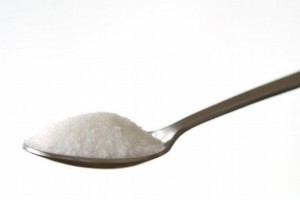 SHELLEY: Well, just a second, Rick Johnson, people don’t think of table sugar as fruit.
SHELLEY: Well, just a second, Rick Johnson, people don’t think of table sugar as fruit.
RICHARD JOHNSON: Okay, so let’s talk about this. Fructose is a sugar. And it’s present in certain foods one of the foods that it’s present in is fruit. It’s also present in honey. We normally think of fruit and honey as being healthy. But fructose is also present in sugar and sugar, or table sugar, is sucrose. But it consists of a molecule that contains fructose and glucose bound together. When you eat sugar, it’s broken down into fructose and glucose in your intestines. Fructose is also present in the sweetener known as high fructose corn syrup. And this is a sweetener derived from corn and it consists of free fructose and free glucose mixed together. The most common sources of fructose in our diet is not from fruit it’s from these added sugars table sugar and high fructose corn syrup
SHELLEY: Are we taking in more sugar today than we did 200 years ago?
RICHARD JOHNSON (LAUGHS) Absolutely so, we have been increasing their sugar intake dramatically in the last 300 to 400 years and it’s particularly gone up in the last 50 years following the introduction of high fructose corny syrup.
SHELLEY: For people who are concerned about the health of themselves and their families, when they switch from soda. to fruit juices, is that a good idea?
RICHARD JOHNSON: Natural fruits, although they contain fructose, they also contain a lot of good ingredients. They contain vitamin C, antioxidants and many things that actually combat the effects of fructose. In fact, natural fruits are healthy
SHELLEY: And when you say a natural fruit, you mean an apple, that you bite into and chew. Or a pear, or a watermelon. Not the natural juice. The whole fruit.
RICHARD JOHNSON: Yes. The whole fruit, and there are some truths that are worse than others in terms of fructose content. But having said that, natural fruits tend to have not so much fructose, and they have a lot of good ingredients. However when you drink fruit juice, it’s combining a number of fruit in one glass and so you get a larger amount of sugar — you get a larger amount of fructose, and when you drink it really fast, you get high concentrations very rapidly in your blood. So it turns out that fruit juices are probably not healthy–instead, the amount of fructose overwhelms the good things in the juice and there’s now a very good data showing that children who drink too much fruit juice are at high risk of becoming obese
SHELLEY: Well, let’s talk some more about children, because they are our biggest concern We adults, we can make choices because we’re grownups. But kids, other people make choices for them. And children are in the time of their life when their habits are forming, and already, we have a number of children who are obese or have high blood pressure or have other signs that their health is in trouble. Does that group of children, those with obesity or high blood pressure and so on, need a different diet and exercise program than other children do? Because of how their bodies are working?
RICHARD JOHNSON: Yes. I think we need to have a health policy for everybody. But I agree that children childhood obesity is becoming an increasingly major problem. One in six children now are obese. Many of them are developing high blood pressure. Many of them are developing insulin resistance, and we are now seeing type II diabetes occurring in child Not only that, but it affects their performance. There are now studies that show that it affects their ability to perform tasks. Cognitive function, can be effected.
Longterm Sugar Use and ADHD
 SHELLEY: They can be more hyperactive. They can have trouble learning. They can be easily falling asleep when they’re trying to learn, because they’re so tired.
SHELLEY: They can be more hyperactive. They can have trouble learning. They can be easily falling asleep when they’re trying to learn, because they’re so tired.
RICHARD JOHNSON: And we have actually published a paper linking chronic sugar intake with attention deficit hyperactivity syndrome.
SHELLEY: Now Rick Johnson, when you say “chronic,” that means something that happens for a long time. Meaning regular use over days and weeks and months and even years. Which is kind of how all children use sugar.
RICHARD JOHNSON: Yes. Back in the 1980s there were some studies done to look at how sugar might have a role in attention deficit hyperactivity disorder. Or “ADHD.” And those studies involved giving a single dose of sugar or a very short period of sugar intake to look for how it might affect attention deficit disorder. The studies were negative and so the conclusion was that sugar didn’t have a role in ADHD. But they were looking at acute effects of sugar. When we look at the studies and the literature in terms of trying to to look at the relationship between chronic sugar intake and ADHD, suddenly it becomes a very very strong compelling argument that eating sugar for months to years may dramatically increase the risk for ADHD.
SHELLEY: That’s just one example of a health issue that might be affected by eating sugar.
RICHARD JOHNSON: Correct.
SHELLEY: This is a dilemma, because right now, USDA food policy has stated that as many as 1/3 of calories can come from sugar in food. And it’s been deemed that if it’s a calorie, and it’s not too many calories, that’s not a problem.
RICHARD JOHNSON: Yes so what we’re learning is is that fructose is biologically active. It isn’t just a calorie. In fact we even have some experimental data suggesting that it may increase the risk for food allergies. Fructose intake and sugar intake in children may have a role in why we’re seeing such an increased risk of anaphylaxis and severe allergies to peanuts and other proteins.
SHELLEY: And perhaps celiac disease and other autoimmune conditions.
RICHARD JOHNSON: That’s correct.
Who’s Susceptible to Fructose Sugar? It Depends on Your Fructokinase
SHELLEY: So, if we have all of this happening, and there are some children who can drink as much chocolate milk as they want. And some children that can eat cookies, and they don’t have a problem. And then you have some children who are overweight and tired. And they’re told, make sure that you eat the chips that are baked, not fried. And avoid eating any cheese. and instead, drink the no-fat chocolate milk. And not the whole milk. Because, it has fewer calories. And exercise more. What’s going to happen to those children who already have metabolic syndrome?
RICHARD JOHNSON: You’re bringing up a very interesting point which is that not everyone seems to be so sensitive to the effects of sugar. There are young people out there who are eating huge amounts of sugar and they still stay skinny and the question is why? Studies that we’ve done here at the University as well as elsewhere, have shown that, especially in children, many children don’t absorb fructose very effectively. Perhaps two out of three young children won’t absorb all their fructose. We did a study which is not published yet, but it was done at Children’s Hospital here, and we looked at children who have fatty liver, and we found that those children who have fatty liver and who were overweight, when they received a dose of fructose, they absorbed almost all of it. Whereas the lean children did not. Most of them mal-absorbed some of the fructose.
SHELLEY: On the playground, some of the children who are leaner might tell the heavier children, well, I’m thinner just because I’m quicker than you. And I have higher energy, and you guys that are slow, you’re fat and lazy.
RICHARD JOHNSON: That’s not the way it works. So the sugar, once you start absorbing the sugar, it will over time, reduce your mitochondria so, mitochondria, our body is made up of cells, and we have millions and millions of cells that constitute our body. And each cell has a nucleus, which is kind of brain of the cell, but each cell also contains little units called mitochondria. These mitochondria are what produce energy
 Mitochondria – Does Sugar Kill Our Batteries?
Mitochondria – Does Sugar Kill Our Batteries?
SHELLEY: Are they like batteries? Our EverReady battery inside the cell?
RICHARD JOHNSON: They are like our batteries. They’re basically the energy factories of the cell, and they produce the energy that runs our cells. When you produce a lot of energy, that it is important in being able run, and to bicycle, and to climb mountains, and to swim and stay up. The energy we produce is very important, and that energy is called ATP. When a person eats more food, generally they will produce more energy. But with fructose, when you eat more, it actually slows the production of the energy, so it has an opposite effect. So you produce less energy, and you accumulate more fat, and when you produce less energy, you tend to be more tired. Now what happens over time — the more sugar you eat, it actually seems to cause damage to the mitochondria. Over time, you may actually lose mitochondria. At that point, you are almost locked into a lower energy state. Unless you can stimulate the growth of more mitochondria to allow you to get back to your original energy level.
SHELLEY: You mean that once a child or a grownup’s body is in trouble, metabolically, then eating more sugar will help them feel more energetic for a few minutes or perhaps an hour or so. But in the long run, eating that sugar might be killing more of the batteries inside of their cells?
RICHARD JOHNSON: Yes. Basically over time, you start to lose these mitochondria. Now in children who become obese, most of them still are have quite a few mitochondria, so they can recover quicker. You can get them back to normal weight easier than you can a 55-year-old or 60 year old, who may have lost quite a few mitochondria. It’s going to be harder to get that person back to a low stable weight, unless you find ways to stimulate their mitochondria to increase their numbers. The very best way is exercisek
SHELLEY: So even though it really will be harder for a child who’s overweight to exercise, because their body is not as good at handling energy yet, it might be even more important for that child to exercise.
RICHARD JOHNSON: That’s right. Exercise is one of the best ways to stimulate mitochondrial growth, and that will allow one to help reset to their weight.
Our Bodies Can Turn Starches INTO FRUCTOSE?
SHELLEY: Let’s talk a little bit more about what fructose can do to a person’s body, if their body doesn’t handle fructose very well. You have mentioned in your research that if a body is not handling fructose well, it can start to mean that the body cannot handle any starch or sugar well. The body starts to turn any kind of carbohydrate that it takes in, into fructose, which starts messing up the body again.
RICHARD JOHNSON: Yes, and classically we think that most the fructose that we get is coming from our diet. So we think the greatest amount of fructose is coming from the sugars we eat because those sugars contain fructose. But it is true that our group has recently discovered that inside our bodies, fructose can be made from carbohydrates, even when those carbohydrates don’t contain fructose. So unfortunately under certain circumstances our bodies convert carbohydrates that we’re eating into fructose. Now, our paper on this hasn’t yet been published, but we do have strong data that this does occur at least in animals, and and so it would be interesting to determine if this is one of the mechanisms driving obesity today, and one of the reasons why carbohydrates have been so strongly associated with obesity and diabetes.
SHELLEY: I’m thinking about the overweight child who goes to lunch, and is told especially because you’re overweight, child, you should be eating your bread, and you should be eating your potato and you should be eating your chocolate milk, and you should not be adding any oils to what you’re eating, and you should certainly avoid that cheese, because fat contains more calories per spoonful, and you should be limiting your calories. For a child whose body is turning their carbohydrates into fructose, and then storing those fructose calories as fat instead of using it as energy, or for an adult whose body is doing this counter-productive conversion of fuel into fructose, is getting most of your energy from carbs a recipe for success, telling them to eat their bread and potatoes but cut the fat, or is that a recipe for disaster?
RICHARD JOHNSON: Probably not a good recipe for success. I think that if you have a child who’s overweight, the first thing to do is to try to limit the amount of sugar that child is eating. Without a doubt that’s the number one first thing you should do. You should try to look at all that packages, trying to see if they’re eating sources of sugar you may not know. High fructose corn syrup can be concentrated in certain foods foods that we think of as healthy, such as fruit yogurt, which can sometimes be filled with sugar – and fruit juices. So the first thing is to try reduce the sugar — maybe all it takes and we’ve had some overweight or obese children become suddenly lean in a period of a few months just with that maneuver alone.
SHELLEY: And more energetic
RICHARD JOHNSON: And more energetic.
SHELLEY: And more happy and less tired.
RICHARD JOHNSON: Absolutely. It can be an amazing transformation and children can turn around very quickly. If that’s not working it’s possible that those children, their bodies may already have found a way to be converting the carbs they eat into fructose, even when they’re not eating fructose.
SHELLEY: And it’s not that these children have done something that’s diabolical or bad. It’s just that their cells are struggling with the modern way that we eat. And they’re using a compensation that isn’t really working for their body.
RICHARD JOHNSON: That’s right. And we’re still trying to figure out how that happens but it looks quite likely that some people are converting carbs to fructose in their body
SHELLEY: And then they’re storing the fructose as fat instead of burning it for energy.
RICHARD JOHNSON: Right. So if just reducing sugar is not enough to see a very significant change in weight, it may be reasonable to restrict carbohydrates in general. And so I think that that is something we should be thinking more and more about. I know everyone’s worried in children, to restrict carbs too much, but I do think that the data is the data, and it looks like some carbohydrate restriction may be of significant benefit to these children who are overweight, who do not respond just to restricting sugar.
SHELLEY: Then could you give them a little bit more fat?
RICHARD JOHNSON: Yes, so foods like cheese and milk and dairy products are actually I feel are very healthy. They actually help neutralize some of these effects of fructose, and so I do believe that dairy products are good. I think unsalted nuts are good. There are a variety of foods that I would recommend. And if they have to eat a sweet, I would give them 70% dark chocolate, which actually contains substances that stimulate mitochondrial growth, and it still tastes good and it doesn’t have that much sugar!

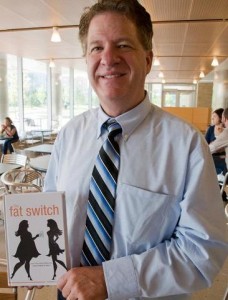

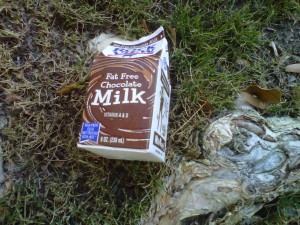
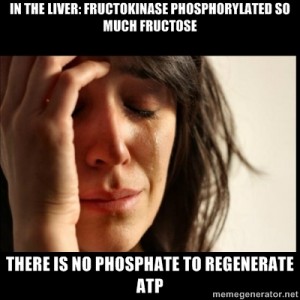

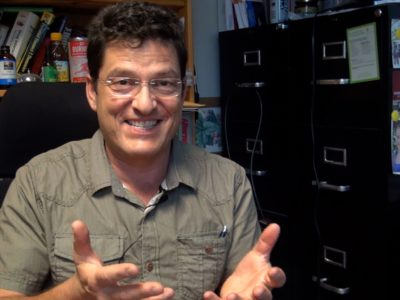



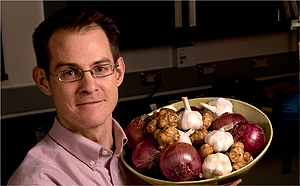
2 comments for “Rick Johnson: Longterm sugar use can kill cellular “batteries” and promote fat and ADHD”